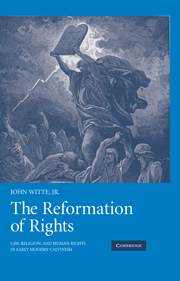Book contents
- Frontmatter
- Contents
- List of illustrations
- Preface and acknowledgments
- List of abbreviations and references
- Introduction
- 1 Moderate (religious) liberty in the theology of John Calvin: The original Genevan experiment
- 2 The duties of conscience and the free exercise of Christian liberty: Theodore Beza and the rise of Calvinist rights and resistance theory
- 3 Natural rights, popular sovereignty, and covenant politics: Johannes Althusius and the Dutch Revolt and Republic
- 4 Prophets, priests, and kings of liberty: John Milton and the rights and liberties of Englishmen
- 5 How to govern a city on a hill: Covenant liberty in Puritan New England
- 6 Concluding reflections: The biography and biology of liberty in early modern Calvinism
- Bibliography
- Index to biblical sources
- Index
2 - The duties of conscience and the free exercise of Christian liberty: Theodore Beza and the rise of Calvinist rights and resistance theory
Published online by Cambridge University Press: 05 February 2015
- Frontmatter
- Contents
- List of illustrations
- Preface and acknowledgments
- List of abbreviations and references
- Introduction
- 1 Moderate (religious) liberty in the theology of John Calvin: The original Genevan experiment
- 2 The duties of conscience and the free exercise of Christian liberty: Theodore Beza and the rise of Calvinist rights and resistance theory
- 3 Natural rights, popular sovereignty, and covenant politics: Johannes Althusius and the Dutch Revolt and Republic
- 4 Prophets, priests, and kings of liberty: John Milton and the rights and liberties of Englishmen
- 5 How to govern a city on a hill: Covenant liberty in Puritan New England
- 6 Concluding reflections: The biography and biology of liberty in early modern Calvinism
- Bibliography
- Index to biblical sources
- Index
Summary
Once the free exercise of the true religion has been granted … the ruler is so much more bound to have it observed [that] if he acts otherwise, I declare that he is practicing manifest tyranny, and [his subjects] will be all the more free to oppose him. For we are bound to set greater store and value in the salvation of our souls and the freedom of our conscience than in any other matters, however desirable.
Theodore Beza (1574)THE ST. BARTHOLOMEW'S DAY MASSACRE
In the early morning of August 24, 1572, armed soldiers, acting on royal orders, broke into the Paris bedroom of French Calvinist leader, Admiral Gaspard de Coligny, and stabbed him to death. The soldiers heaved his corpse from the window into the courtyard below where a mob was gathering. They slashed and mutilated the corpse further and then began dragging it, now bereft of head, hands, and genitals, through the streets of Paris. Church bells peeled from the monastery of St. Germain l'Auxerrois signaling the start to a pogrom. On cue, soldiers and a growing mob of Catholic supporters began to break into the homes and shops of Calvinists, slaughtering them and pillaging their goods with growing abandon. Waves of popular violence and savagery broke out in the following weeks not only in Paris but also in several other French cities and towns.
- Type
- Chapter
- Information
- The Reformation of RightsLaw, Religion and Human Rights in Early Modern Calvinism, pp. 81 - 142Publisher: Cambridge University PressPrint publication year: 2008



